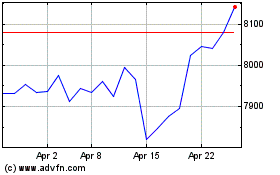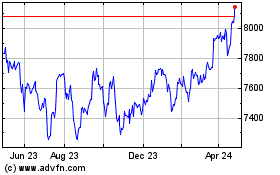LONDON MARKETS: London Markets Flat As Investors Puzzle Over Brexit
March 13 2019 - 8:02AM
Dow Jones News
By Emily Horton
London markets were flat on Wednesday, after U.K. Prime Minister
Theresa May's revised Brexit agreement was rejected by U.K.
lawmakers.
But in further votes due later today, the U.K. parliament is
likely to vote to definitively rule out leaving the EU without a
deal.
How did markets perform?
The U.K.'s FTSE 100 spent the morning hovering around the
break-even line, often up or down by less than 0.1%, at around
7154. The market finished up 0.3% on Tuesday.
The British pound recovered some of yesterday's losses, jumping
0.7% to $1.3159 from $1.3073 late Tuesday evening in New York.
What's driving the markets?
On Tuesday evening, May's Brexit withdrawal deal was rejected by
parliament for the second time, by 391 votes to 242.
"The government has wasted the last two years and this is mainly
due to [May] because Theresa May knew that her own party isn't
supporting her on this deal. Despite this, she tried to trick them
with her set of tactics... we have lost Brexit now," Naeem Aslam,
chief market analyst, ThinkMarkets said in a client note.
"So far the market has priced in a rejection of no deal Brexit.
What isn't priced is how long the extension of the Brexit deadline
will be, and most important, the difficulties involved in this
process to secure such a deadline," he added.
Later today U.K. lawmakers will hold further Brexit votes. May
has offered a vote on leaving the EU with no agreement in place; a
concession to parliament's pro-Europeans, as MPs are widely
expected to reject that notion with a large majority.
Against this backdrop, Wednesday's statement on the U.K.'s
public finances from chancellor Philip Hammond is likely to be
overshadowed.
"In the absence of a smooth transition at the end of this month
any government forecasts for the U.K. economy are likely to be no
more than educated guesses. The one plus point is that fiscal Phil
has managed to build up a decent buffer due to better than expected
tax receipts over the past 12 months." Michael Hewson, chief market
analyst at CMC Markets U.K., told clients in a note.
What stocks are active?
Standard Life Aberdeen PLC (SLA.LN) added almost 3%, after the
GBP552bn asset manager ditched its co-chief executive structure
less than two years after it was put in place, giving Keith Skeoch
sole oversight. However, the firm also reported a 1.5% fall in
profits in 2018
(http://www.marketwatch.com/story/standard-life-aberdeen-profit-slips-2019-03-13).
Food retailer Wm. Morrison Supermarkets PLC (MRW.LN) initially
surged, but then fell back 0.7% as it reported a dip in profit
(http://www.marketwatch.com/story/morrisons-profit-falls-declares-special-dividend-2019-03-13).
According to a client note from Neil Wilson, chief market analyst
for Markets.com, results showed "impressive revenue growth with
ex-fuel sales +5.1%, the best performance in a decade".
Shares in insurance group Prudential PLC (PRU.LN) also had a
volatile morning, but stabilized around 0.1% up, after the group
announced its profit rose in 2018
(http://www.marketwatch.com/story/prudential-profit-climbs-led-by-asia-growth-2019-03-13),
spurred on by its new business expansion in Asia.
(END) Dow Jones Newswires
March 13, 2019 07:47 ET (11:47 GMT)
Copyright (c) 2019 Dow Jones & Company, Inc.
FTSE 100
Index Chart
From Mar 2024 to Apr 2024

FTSE 100
Index Chart
From Apr 2023 to Apr 2024
